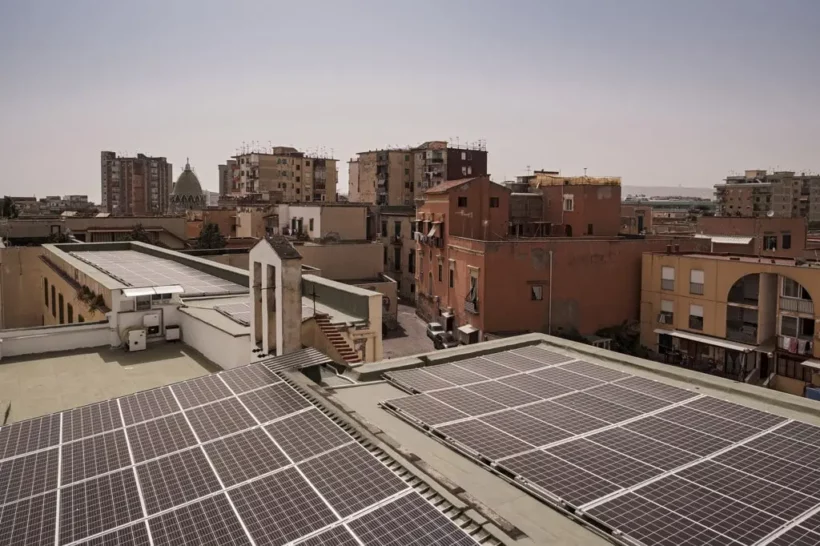 By DR. MIRIAM ACZEL
By DR. MIRIAM ACZEL
In San Giovanni a Teduccio, a coastal suburb in Naples, a new people-driven project has become Italy’s first renewable “solidarity energy community.” Rows of solar panels have been installed on the roof of a community center that offers sports and other afterschool activities for local children, and now provides electricity for 40 low-income families. In addition to providing clean power, the project also aims to engage local residents in learning about energy issues. Not only does it fit in with Italy’s ambitious climate goals to lower carbon emissions, the San Giovanni a Teduccio project provides localized energy access, improves community resilience, and offers environmental education as well.
The project revolves around a 53-kW rooftop solar photovoltaic (PV) system built on Fondazione Famiglia di Maria, the local community center. The roughly 65,000 kWh of electricity that is produced annually by the solar panels is consumed partly by the structure itself and partly shared with the 40 participating families. The “Comunità Energetica e Solidale,” or “Energy and Solidarity Community,” solar roof is located in the Villa District of Naples, on a nineteenth-century building that houses an educational institution. What makes this project unique is that local families have joined together to produce renewable energy for their own consumption.
The “first fair and free energy community in Italy” is the result of a collaboration between three foundations: Legambiente, Fondazione con il Sud, and Fondazione Famiglia di Maria, with the goal of improving social cohesion through the creation of a self-governing energy community. San Giovanni a Teduccio was chosen as the site in order to enable local youth to engage in an important and innovative initiative to build a strong community centered around renewable energy. Legambiente spearheaded the initiative, with support from the organization Fondazione con il sud, which finances social development projects. The roof housing the photovoltaic panels belongs to Famiglia di Maria, an educational institution that collaborates with the social services of the municipality to promote education, particularly for underserved populations. The 166 rooftop solar panels provide clean and free electricity to families in the neighborhood.
The project is projected to generate real savings through renewable energy generation and reduced electricity consumption by all members of the community, with estimates of about 300 thousand euros saved in 25 years. The “green precedent” set by the initiative will hopefully help catalyze further climate action. The community-based approach reduces carbon emissions through renewable energy generation and environmental education, and helps combat energy poverty through social empowerment.
Mariateresa Imparato, the regional president of Legambiente in Campania, explained that “we went to the outskirts of a big city because we wanted it to be a double experiment, environmental and social.” She continued that it’s not enough to find technical energy solutions and stressed the importance of involving citizens and changing the way energy is collectively consumed.
Though their populations and contexts differ, the San Giovanni a Teduccio and Oakland EcoBlock projects share similar goals. Both emphasize environmental justice and community empowerment with a focus on education and resilience. They also recognize that environmental sustainability and energy justice is rooted in social sustainability—the success of these energy models is rooted in the strength of their communities. The combination of localized renewable energy, along with climate literacy and awareness, is a core part of the “just transition” and a critical step towards a more sustainable and inclusive future.
Editor’s note: this article originally appeared on the EcoBlock blog
Cover image: Solar panels on the roof of the Fondazione Famiglia di Maria community center provide energy to 40 local families. Credit: Michele Amoruso for Internazionale (licensed under CC BY-NC-SA 4.0)
Dr. Miriam Aczel is the McQuown Postdoctoral Fellow at the California Institute for Energy & Environment (CIEE) at UC Berkeley, working on the Oakland Ecoblock project. She is also an Honorary Research Associate at Imperial College London’s Centre for Environmental Policy. Miriam earned her PhD at Imperial College London, where she was a President’s PhD Scholar. She is also co-founder and co-director of the Amir D. Aczel Foundation for Research and Education in Science and Mathematics, a nonprofit based in Cambodia.



Leave a Reply